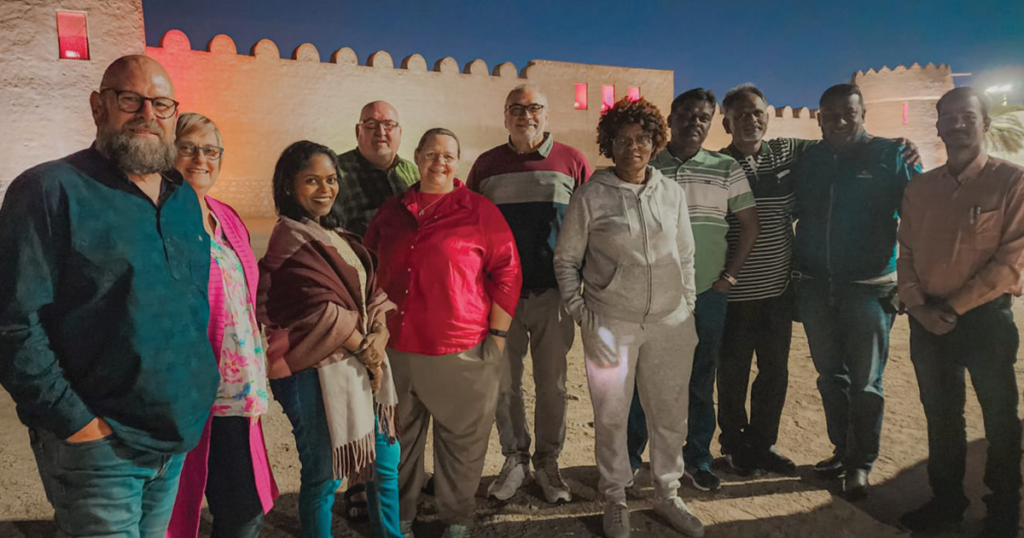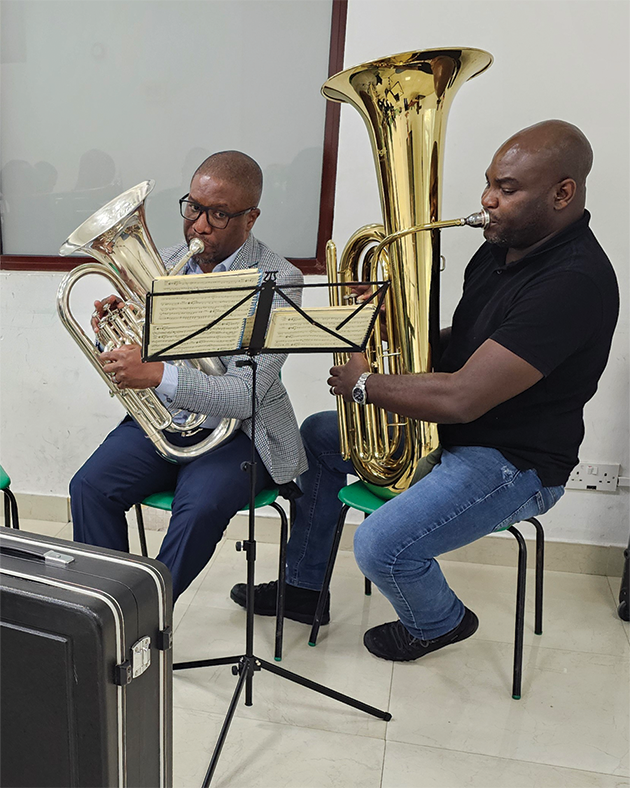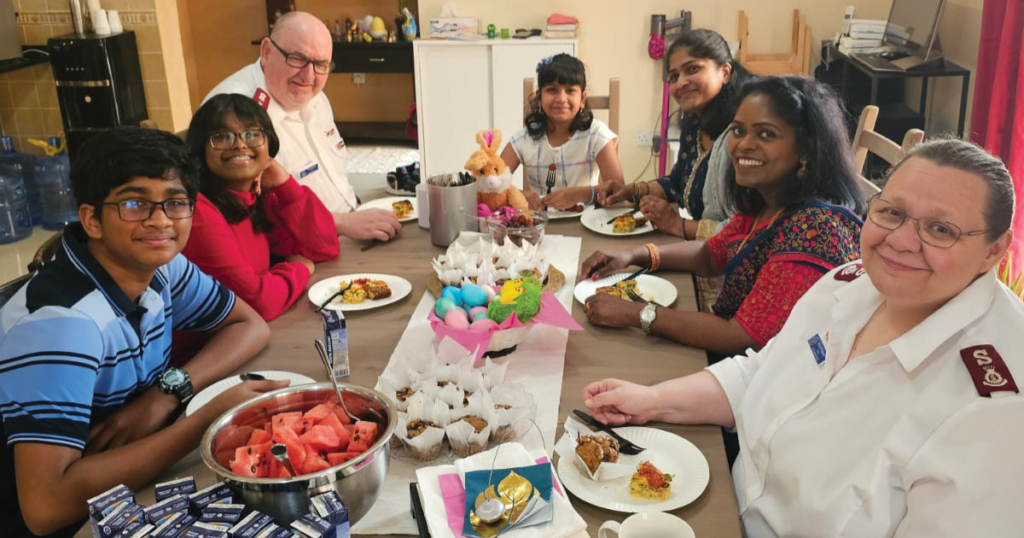Worship Without Borders
"Living here forces us to be living testimonies."
Majors Paul and AmyJo Ferguson from the USA Central Territory were recently reassigned to serve in The Salvation Army’s Middle East Region and responded with Spirit-filled vigor. Majors Ferguson share the story of how they went from North Dakota to the Middle East below.
We returned from a Biblical Education Tour in Israel in 2008 with a deep desire to serve in the Middle East, but at that point there was no official Salvation Army presence in the region and with small children at home, we were not in the position to make an international move. We mentioned this desire to our friends and family, but given the circumstances, it seemed silly to pursue overseas service in any official capacity. Fifteen years later, we were in our office in Grand Forks, ND when we got a call from Lt. Colonel Dan Jennings, who had recently taken the position of personnel secretary. Dan was one of those friends with whom we had shared our hearts for the Middle East many years ago. It just so happened that a call had gone out for personnel in the Middle East and God brought us to his mind. Within weeks we were preparing to move to the Middle East.
Paul is now the regional secretary and AmyJo is the assistant to the regional leader for mission and ministry. We serve as the corps officers of the Dubai and Abu Dhabi corps with oversight of three corps in Oman. AmyJo is the Modern-Day Slavery and Human Trafficking Response (MSHTR) regional contact. There are only four officers in the Middle East Region, so we along with the regional leaders, Majors Doug and Janet Newman, fulfill a lot of responsibilities: corps officers, administrative duties, planning, special programs, etc. AmyJo’s MSHTR activities involve interacting with survivors and offering some limited social services assistance, networking with local agencies and embassies, as well as educational events and activities.
We recently celebrated our first Easter here—which is very different in a country that is not easily open to the gospel. When we moved here, any Bibles or devotional books had to be packed in our suitcases as it is illegal to ship them into the country. I was blessed to find a small Easter section at Daiso (a Japanese store in the mall). It was not religious, but they had a few plastic eggs and some colorful Easter decorations. It’s strange to live in a place that does not recognize or celebrate any Christian holidays. There’s no Easter or Christmas break. Since many churches share the same compounds, very often our congregations can’t celebrate Good Friday or Easter on the actual day. We celebrated Good Friday in Dubai on the Wednesday before Easter because that’s when we’re scheduled to use the compound. This year Easter coincided with the celebration of Ramadan. Since most of the population was fasting during daylight hours, many restaurants were closed during the day. Eating and drinking outdoors during the day could not be done, so there was no way to host Easter picnics or outdoor egg hunts. However, despite the difficulties, Salvationists in the Middle East love to celebrate and worship during the Lenten season.

The Middle East is a beautiful expression of the Army’s internationalism with vibrant congregations in four different countries—Kuwait, the United Arab Emirates, Oman and Bahrain. Within these congregations are Salvationists from all over the world—Uganda, Liberia, Nigeria, India, Zimbabwe, Kenya, the Philippines, Pakistan, Canada and others. While English is the common language spoken in most of the corps, Tamil, Shona, Tagalog and many other languages are also used in the expressions of worship. Like in the US, corps in the Middle East have Bible studies, women’s and men’s ministries, vacation Bible school, and some corps even have brass bands. The Salvation Army does not own property in the Middle East, so worship takes place in church compounds, which are shared among many congregations. Bible studies, prayer meetings and times of fellowship are often hosted in one another’s homes. Since rules regarding public worship often change and evangelism is not allowed, Christians must be very careful when meeting even in private homes.
In addition to worshipping congregations, the Middle East region is active in The Salvation Army’s international efforts in response to human trafficking. Of the 495 survivors who were repatriated by The Salvation Army internationally last year, 223 came from the Middle East region. Many people come to the Middle East in hopes of making enough money to send back to their home countries. Sometimes, the local population is 80 percent or more expats. It’s much more common to meet someone not from the Middle East than someone from the Middle East when out and about. Because of the kafala system, which requires migrant workers to have a local sponsor who is responsible for their visa, workers often get their passports taken away and are easily exploited. The Salvation Army in the Middle East works closely with embassies from around the world to identify and help trafficked persons.
While we are here, we hope to strengthen and encourage the Salvationists in the Middle East. This is a difficult place to be a Christian. Not only are Christians in the minority, but evangelism is illegal, and the activities of the churches can be closely monitored. Being a Christian in the Middle East can make one feel as though they are constantly under threat. The Salvationists here work very hard to make a better life for themselves and their families. It’s a privilege to serve them.

We are praying for stability in the region. As a church it can feel like we are operating on the shifting whims of the governments. It’s a struggle to get certifications to operate. Churches that are found or suspected of breaking the law by evangelizing or fundraising can be sanctioned or even shut down. Since The Salvation Army cannot fundraise in the Middle East, we are entirely dependent on World Services giving.
Our journey here has already confirmed and strengthened our faith. Even as officers it had been a long time since we really stepped out into a completely new experience in which we had to fully rely on God. Living here forces us to be living testimonies. We cannot rely on our preaching and our programming to spread the Word. It’s like Francis of Assisi said, “Preach the gospel at all times, and when necessary, use words.”







